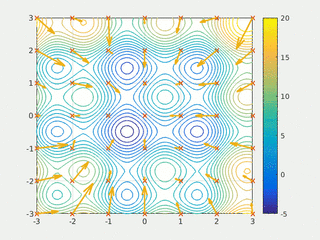In artificial intelligence, genetic programming (GP) is a technique of evolving programs, starting from a population of unfit programs, fit for a particular task by applying operations analogous to natural genetic processes to the population of programs. It is essentially a heuristic search technique often described as 'hill climbing', i.e. searching for an optimal or at least suitable program among the space of all programs.

In computer science and operations research, a genetic algorithm (GA) is a metaheuristic inspired by the process of natural selection that belongs to the larger class of evolutionary algorithms (EA). Genetic algorithms are commonly used to generate high-quality solutions to optimization and search problems by relying on biologically inspired operators such as mutation, crossover and selection.
In computational intelligence (CI), an evolutionary algorithm (EA) is a subset of evolutionary computation, a generic population-based metaheuristic optimization algorithm. An EA uses mechanisms inspired by biological evolution, such as reproduction, mutation, recombination, and selection. Candidate solutions to the optimization problem play the role of individuals in a population, and the fitness function determines the quality of the solutions. Evolution of the population then takes place after the repeated application of the above operators.

In computer science, evolutionary computation is a family of algorithms for global optimization inspired by biological evolution, and the subfield of artificial intelligence and soft computing studying these algorithms. In technical terms, they are a family of population-based trial and error problem solvers with a metaheuristic or stochastic optimization character.

In computational science, particle swarm optimization (PSO) is a computational method that optimizes a problem by iteratively trying to improve a candidate solution with regard to a given measure of quality. It solves a problem by having a population of candidate solutions, here dubbed particles, and moving these particles around in the search-space according to simple mathematical formulae over the particle's position and velocity. Each particle's movement is influenced by its local best known position, but is also guided toward the best known positions in the search-space, which are updated as better positions are found by other particles. This is expected to move the swarm toward the best solutions.

Estimation of distribution algorithms (EDAs), sometimes called probabilistic model-building genetic algorithms (PMBGAs), are stochastic optimization methods that guide the search for the optimum by building and sampling explicit probabilistic models of promising candidate solutions. Optimization is viewed as a series of incremental updates of a probabilistic model, starting with the model encoding an uninformative prior over admissible solutions and ending with the model that generates only the global optima.
In computer programming, genetic representation is a way of representing solutions/individuals in evolutionary computation methods. Genetic representation can encode appearance, behavior, physical qualities of individuals. Designing a good genetic representation that is expressive and evolvable is a hard problem in evolutionary computation. Difference in genetic representations is one of the major criteria drawing a line between known classes of evolutionary computation.
Grammatical evolution (GE) is an evolutionary computation and, more specifically, a genetic programming (GP) technique pioneered by Conor Ryan, JJ Collins and Michael O'Neill in 1998 at the BDS Group in the University of Limerick, although there are other related works, which were published even before, such as.
Multi-objective optimization is an area of multiple criteria decision making that is concerned with mathematical optimization problems involving more than one objective function to be optimized simultaneously. Multi-objective optimization has been applied in many fields of science, including engineering, economics and logistics where optimal decisions need to be taken in the presence of trade-offs between two or more conflicting objectives. Minimizing cost while maximizing comfort while buying a car, and maximizing performance whilst minimizing fuel consumption and emission of pollutants of a vehicle are examples of multi-objective optimization problems involving two and three objectives, respectively. In practical problems, there can be more than three objectives.
ParadisEO is a white-box object-oriented framework dedicated to the flexible design of metaheuristics. It uses EO, a template-based, ANSI-C++ compliant computation library. ParadisEO is portable across both Windows system and sequential platforms. ParadisEO is distributed under the CeCill license and can be used under several environments.
Cooperative Coevolution (CC) is an evolutionary computation method that divides a large problem into subcomponents and solves them independently in order to solve the large problem.

In numerical optimization, meta-optimization is the use of one optimization method to tune another optimization method. Meta-optimization is reported to have been used as early as in the late 1970s by Mercer and Sampson for finding optimal parameter settings of a genetic algorithm.
In applied mathematics, multimodal optimization deals with optimization tasks that involve finding all or most of the multiple solutions of a problem, as opposed to a single best solution. Evolutionary multimodal optimization is a branch of evolutionary computation, which is closely related to machine learning. Wong provides a short survey, wherein the chapter of Shir and the book of Preuss cover the topic in more detail.
MCACEA is a general framework that uses a single evolutionary algorithm (EA) per agent sharing their optimal solutions to coordinate the evolutions of the EAs populations using cooperation objectives. This framework can be used to optimize some characteristics of multiple cooperating agents in mathematical optimization problems. More specifically, due to its nature in which both individual and cooperation objectives are optimize, MCACEA is used in multi-objective optimization problems.

HeuristicLab is a software environment for heuristic and evolutionary algorithms, developed by members of the Heuristic and Evolutionary Algorithm Laboratory (HEAL) at the University of Applied Sciences Upper Austria, Campus Hagenberg. HeuristicLab has a strong focus on providing a graphical user interface so that users are not required to have comprehensive programming skills to adjust and extend the algorithms for a particular problem. In HeuristicLab algorithms are represented as operator graphs and changing or rearranging operators can be done by drag-and-drop without actually writing code. The software thereby tries to shift algorithm development capability from the software engineer to the user and practitioner. Developers can still extend the functionality on code level and can use HeuristicLab's plug-in mechanism that allows them to integrate custom algorithms, solution representations or optimization problems.
In applied mathematics, test functions, known as artificial landscapes, are useful to evaluate characteristics of optimization algorithms, such as:
The MOEA Framework is an open-source evolutionary computation library for Java that specializes in multi-objective optimization. It supports a variety of multiobjective evolutionary algorithms (MOEAs), including genetic algorithms, genetic programming, grammatical evolution, differential evolution, and particle swarm optimization. As a result, it has been used to conduct numerous comparative studies to assess the efficiency, reliability, and controllability of state-of-the-art MOEAs.
Distributed Evolutionary Algorithms in Python (DEAP) is an evolutionary computation framework for rapid prototyping and testing of ideas. It incorporates the data structures and tools required to implement most common evolutionary computation techniques such as genetic algorithm, genetic programming, evolution strategies, particle swarm optimization, differential evolution, traffic flow and estimation of distribution algorithm. It is developed at Université Laval since 2009.
The constructive cooperative coevolutionary algorithm (also called C3) is a global optimisation algorithm in artificial intelligence based on the multi-start architecture of the greedy randomized adaptive search procedure (GRASP). It incorporates the existing cooperative coevolutionary algorithm (CC). The considered problem is decomposed into subproblems. These subproblems are optimised separately while exchanging information in order to solve the complete problem. An optimisation algorithm, usually but not necessarily an evolutionary algorithm, is embedded in C3 for optimising those subproblems. The nature of the embedded optimisation algorithm determines whether C3's behaviour is deterministic or stochastic.
The Genetic and Evolutionary Computation Conference (GECCO) is the premier conference in the area of genetic and evolutionary computation. GECCO has been held every year since 1999, when it was first established as a recombination of the International Conference on Genetic Algorithms (ICGA) and the Annual Genetic Programming Conference (GP).





